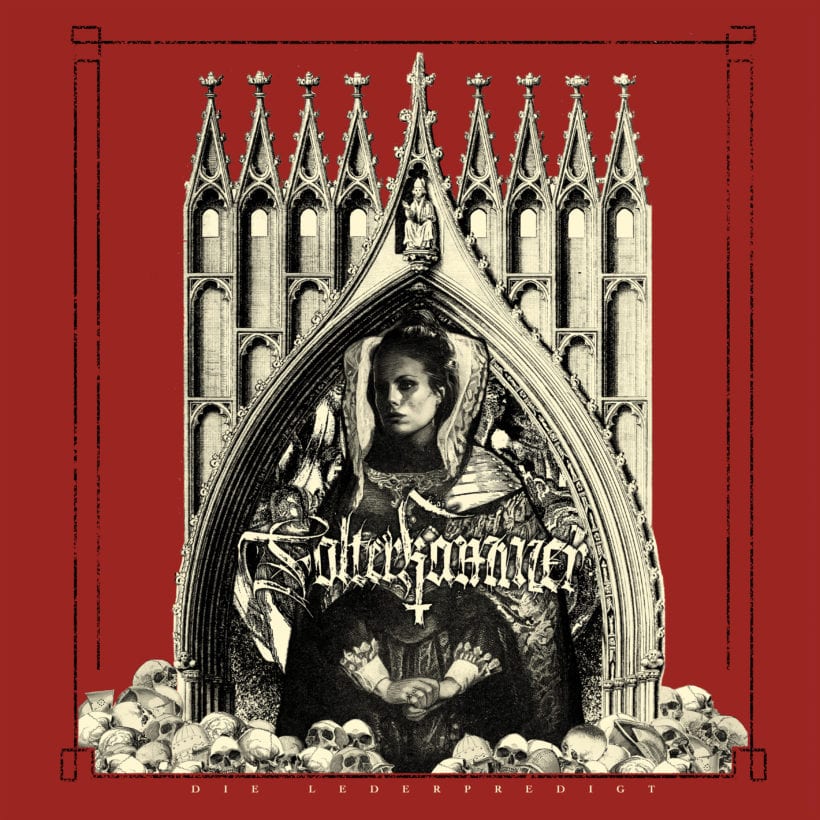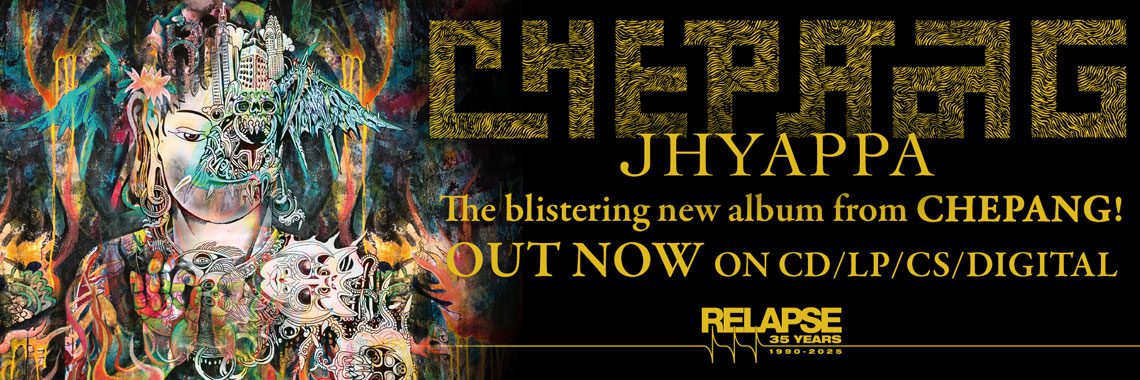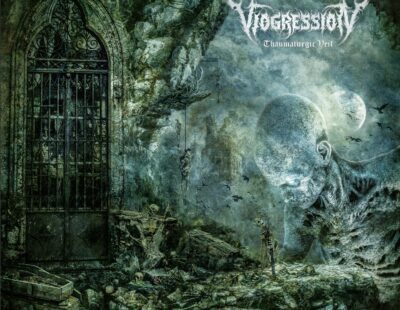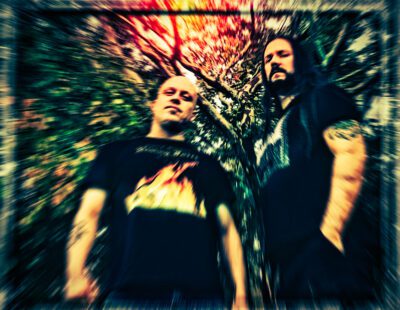
Black metal and opera are unlikely bedfellows, but pairing is seamless on Die Lederpredigt, the new album from black metal genre benders Folterkammer. A collaboration between members of New York City’s Imperial Triumphant and Swiss singer Andromeda Anarchia, Folterkammer thrive in the space between opposing genres.
Enter Folterkammer’s world and stream “Die Nänie,” the first song on Die Lederpredigt. It’s an exciting introduction to the band, which begins with classical, operatic vocals before embracing icy, second-wave black metal propelled by tremolo picking and soaring, high-pitched shrieks. When the quartet combine black metal instrumentals with Anarchia’s vocals, Folterkammer reach a high point where the familiar becomes something new.
Decibel spoke with the members of Folterkammer regarding Die Lederpredigt, religion, traditional black metal and more. Press play on “Die Nänie” and read it below. Die Lederpredigt will see the light of day on December 11 via Gilead Media.
The project fuses second-wave-style black metal with opera. Where did that inspiration come from and how are two genres related?
Anarchia: All four of us love black metal. Zachary [Ezrin, guitar and arrangements] and I also love jazz and classical music and we are big fans of Nina Hagen, Klaus Nomi and opera with German lyrics. I started out as a classically trained soprano and Zachary studied classical composition. We both wanted to play in a band in which we could combine both worlds.
The most interesting aspect of this combination is the strong contrast: opera is considered beautiful and refined, has a long tradition, the orchestral compositions are complex and the singing is technically extremely demanding and virtuoso. Special buildings were built especially for this kind of music; there are beautiful opera houses all over the world.
Black metal, on the other hand, is totally underground and pure rebellion against everything beautiful, loving, elite and dogmatic. This music is dark, raw, direct, the sounds are dirty, distorted, with many high-pitched, screeching screams, and the lyrics are provocative and evil. Many classic black metal recordings and live performances sound deliciously rough and filthy.
Opera and black metal are both very defined styles of music and need to be performed intensely. The combination of these two styles makes opera singing sound darker, spicier, more experimental and modern, and the influence of opera music gives black metal more virtuosity and theatrical embellishment.
What is the background of the members of the band? Has everyone played extreme metal before?
Anarchia: I’m a classically trained soprano, but I didn’t want to become a traditional opera singer because I like to write my own music, improvise, and experiment with my voice in all possible and almost impossible ways.
Classical singers are trained to sing with great precision and virtuosity: the singing is clean and they are trained to sing with a big sound (without microphones). It’s a very impressive art form, but somehow I got bored of the strict rules and traditions. That’s why I dropped out of my classical singing studies and concentrated on my own music projects; I continued my vocal training but focused on contemporary and experimental vocal styles. I also love dirty, scratchy sounds and distortion and eventually ended up making metal screams.
As the lead singer of Folterkammer, I want to add a touch of Nina Hagen’s playfulness and humour when I combine operatic singing with black metal. Nina Hagen mixed operatic singing with punk rock in a fresh and theatrical way. I’ve always loved it and I would like to apply this in the context of extreme metal and expand its range of expression with growls and other metal screams.
Most of the time I sing and write for progressive, avant-garde and experimental music projects: in the end, everything I do in music is a mixture of everything I love. Whatever I do in music, it is often unorthodox and far from anything that is considered “normal, formal or traditional”.
I usually work for my progressive rock project DARKMATTERS and appear as a guest singer in a metal context, for example on the last two ImperiaI Triumphant albums (Vile Luxury and Alphaville) and for the American metal jazz trio Kilter.
Religious symbolism is a factor on this record. Which religions did you cover when writing this album?
Anarchia: With Folterkammer we wanted to take up the traditional black metal aesthetic and I wanted to do the same with the lyrics. Satanism, the opposition of the Christian faith, blood fetish and submission are traditional black metal themes. I picked up the symbolism a little, but pulled it in a different direction: just as dark, evil and blasphemous, but less satanism, instead all the more feminine forces and S&M aesthetics.
Christian churches make up the majority of religions in Switzerland (where I grew up) so I’ve mostly played around with Christian symbolism, but it’s actually about the destructive effects of blind faith/obedience in general. Religions are usually full of symbolism, superstitions, dogmas, strict laws and rituals, indoctrinations about morality and shame, punishments and full of mystical and bizarre stories. This is a great playground to mess around with. I love the art of blasphemy.
As a woman, how can I seriously support religions, lifestyles and ideologies that oppress women and create and support structures of patriarchy, bigotry and chauvinism? No way! But since I wanted to move within these traditional religious / satanic symbols for the lyrics, I described the destructive force as feminine and made her the protagonist as the goddess of evil.
The band name and lyrics are both in German, a notable difference from Zachary’s other band Imperial Triumphant. Why do you feel this language better represents Folterkammer?
Anarchia: Whenever I performed guest vocals for Imperial Triumphant, I added German lyrics at Zachary’s request (he loves the sound of the German language).
The lyrics for Folterkammer are intentionally written in German, as Swiss German and German are my mother tongue. German is a wonderful, very poetic language. In my humble opinion, German also sounds absolutely fantastic for operatic singing and metal screams. It sounds so vulnerable and hurtful at the same time, so romantic and dramatic, so beautiful and so evil, so touching and so cold. The art of dramatic singing is all about contrast and strong dynamics: this language is perfect for Folterkammer.
What was the writing process for the album like?
Anarchia: Zachary contacted me and told me about Darren’s compositions that could be the perfect setting for our ambitions to mix opera with black metal. Darren [Hanson, bass] lives on the West Coast, Zachary, Brendan and I live in New York. Zachary sent me the first rough mixes of the instrumental recordings. I wrote the lyrics, vocal themes and choir lines for the songs at home, then played around with them in a jazzy way during the recording session. Some of the vocal parts are completely improvised. This enabled me to authentically express myself the way I wanted and quickly adapt my ideas to Zachary’s artistic visions for Folterkammer. The vocal recordings were great fun!
In contrast to opera, it’s not about perfection, but about extreme emotions and expression. We recorded my singing and screaming in Imperial Triumphant’s rehearsal room while other musicians practiced drums and other instruments in the rooms next door. This resulted in a totally rough basement atmosphere that I absolutely loved for a black metal band recording session. Zachary, the band’s art director and guitarist, was there, and Steve Blanco, the bassist of Imperial Triumphant, was in charge of the sound engineering (and mixing). I love to work with both of them: always fantastic, extremely experimental and open-minded musicality! I later met Brandan [McGowan, drums] and Darren personally through Zachary. All of them are great artists and I am deeply grateful and honored to have this opportunity to make music with them.
However, writing the lyrics for Folterkammer was very difficult for me. To get inspiration for evil lyrics, I did some research about all kinds of dark and evil things that happen in real life. I wanted to be inspired by real facts, not fiction. True stories, real “devils” / “monsters” in the form of people. It had a huge impact on me and I was depressed for several weeks. I had to regain control of my emotions and the best way for me is through artistic, musical expression, and humor. As artists we create worlds and this is not always a comfortable and easy process. The voice needs emotional substance to nourish the singing and to interpret the lyrics authentically. The operatic approach helped me a lot here. It has helped me turn all of my emotions into some kind of stage play that I have to perform. So I was able to accept the evil goddess/mistress as an acting role and interpret it as a singer. It helped me find my inner distance from the emotions I felt when I read all of these terrible things during the research period.
The album’s story is told from the point of view of a goddess. Why did you choose this perspective to tell the story?
Anarchia: For Folterkammer I wanted to create a dangerous, vicious and powerful goddess because we usually associate feminine nature as kind, loving and protective. When growing up in European countries, one is confronted in one way or another with the Christian concept of the “holy mother” about the role and function of a woman. Inspired by the S&M aesthetic, I portrayed the “unholy mother” as a sensual, seductive, monstrous, dominant, vicious mistress who is the source of all suffering: a “femme fatale” with a great desire to inflict excruciating pain on all living souls.






